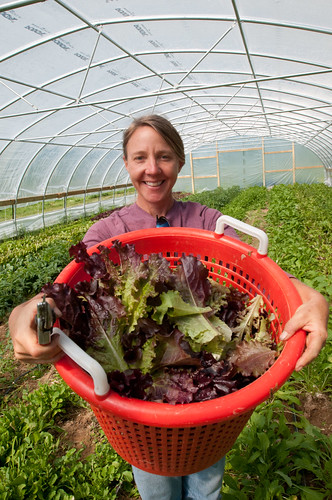
Growing your own fruits and vegetables is an easy thing to do if you use proper techniques. It presents the fact that you are concerned about your plants and you want them to thrive. This is a great thing. However, there are always ways to learn new skills, and hone your existing ones. The following tips can assist you.
If you have an organic garden and children, plant some everbearing strawberries for them. Children will be more willing to help you if they can pluck their own fruit from the garden.
When you are organic gardening, ask your children to lend a hand. Toiling together in the garden brings your family closer together and offers many different opportunities to learn new things and instill green values.
Plants growing in your home need a constant temperature of no less than 65 degrees. In order to encourage proper growth, they will need that warmth. If you don’t want you house to be really warm during the cold season, you could use a heat lamp on organic plants instead.
Use about two to three inches of organic material as mulch in all of your flower beds. By doing this, you can lock in moisture, discourage weed growth, and nourish your plants. As an added bonus, a nice mulch can help make your garden look more finished.
Have plastic bags on hand so that you may cover your muddy gardening shoes. This allows you to keep going, getting back to your garden quickly.
After seeds have sprouted, they require less warmth than they did prior to sprouting. Locate your plants further from your heat source as they mature. You can now take off any protective coverings on your plants that were there to shield them from the elements. Check on your seeds often so you catch them when they are ready.
Coffee Grounds
Add used coffee grounds to your garden soil. Coffee grounds have a lot of nutrients that plants can use. Nitrogen, along with phosphorous and potassium, is an important nutrient in the garden. It contributes to healthy and strong growth of the plant, but don’t overuse it.
Use a laundry basket to help you collect produce from your garden. This will be like a strainer for all your produce. The basket won’t be affected by the water and it will drain right off as though it were poured into a large sieve.
Paying attention to spacing is important. As plants grow and spread out, you will not always know how much space will be required. Failure to provide adequate room will restrict growth because it forces plants to compete for valuable nutrients and oxygen. If necessary, use a ruler to measure the distance between each plant.
Adding mulch to your garden can make your soil healthier. The mulch acts as a protection for the soil under it. On hot days, mulch insulates the ground, keeping it cool and protecting your plants’ roots. This helps soil keep its moisture by reducing the rate of evaporation. It will also serve as a method of controlling unwanted weeds.
One thing that sets organic gardening apart from conventional gardening is that commercial pesticides are not used. While organic foods are healthy for your family, you will still need to check closely for bugs or worms.
Annually rotate your garden. Fungus and disease are more likely to affect plants if they stay in the same location for long periods of time, especially if they belong to the same family. Fungus and disease may stay in the soil and then affect your plants the next growing season. By mixing things up and planting in various spots, you will be able to keep disease and fungus at bay.
If you are starting your seedlings out in small containers, you should use a layer of potting soil that is three times as deep as the size of a single seed. However, you should be aware that certain seeds should not be covered at all because they are required to be in the sunlight. Example of these kinds of seeds include the petunia and the ageratum. If you are unsure as to whether or not your seeds should be covered or not, try to read the package or find the answer online.
Try growing some organic garlic. Garlic cloves should be planted in the spring or fall. They require soil that is well-drained and moist. Plant them approximately 4 inches apart at a depth of 1 or 2 inches beneath the surface of the soil with the pointed end facing upward. Green garlic can be cur directly from the plant and used in a pinch instead of scallions or chives. The garlic is ready to be picked when the tops turn brown. To harden the bulbs’ skin, dry them for several days in the sun. Store the garlic in an area that’s cool, either tied up in bunches or loose.
Organic Garden
You now have the skills, the tools, and the equipment necessary to apply these strategies to your own organic garden. This is great news! If you read this article carefully, you probably learned something new about organic gardening. Hopefully you have found at least one new strategy to utilize in your organic garden.
The watering needs of your garden will vary considerably, depending on your climate zone and the time of year. The amount of water a plant needs depends on the soil type, time of day and the water’s quality. For instance, if you live in a warm, humid climate watering the leaves can cause leaf fungus. Water the roots with care.
Find out just what becoming a certified lawn specialist will do for your organization at Planet Professional


Recent Comments